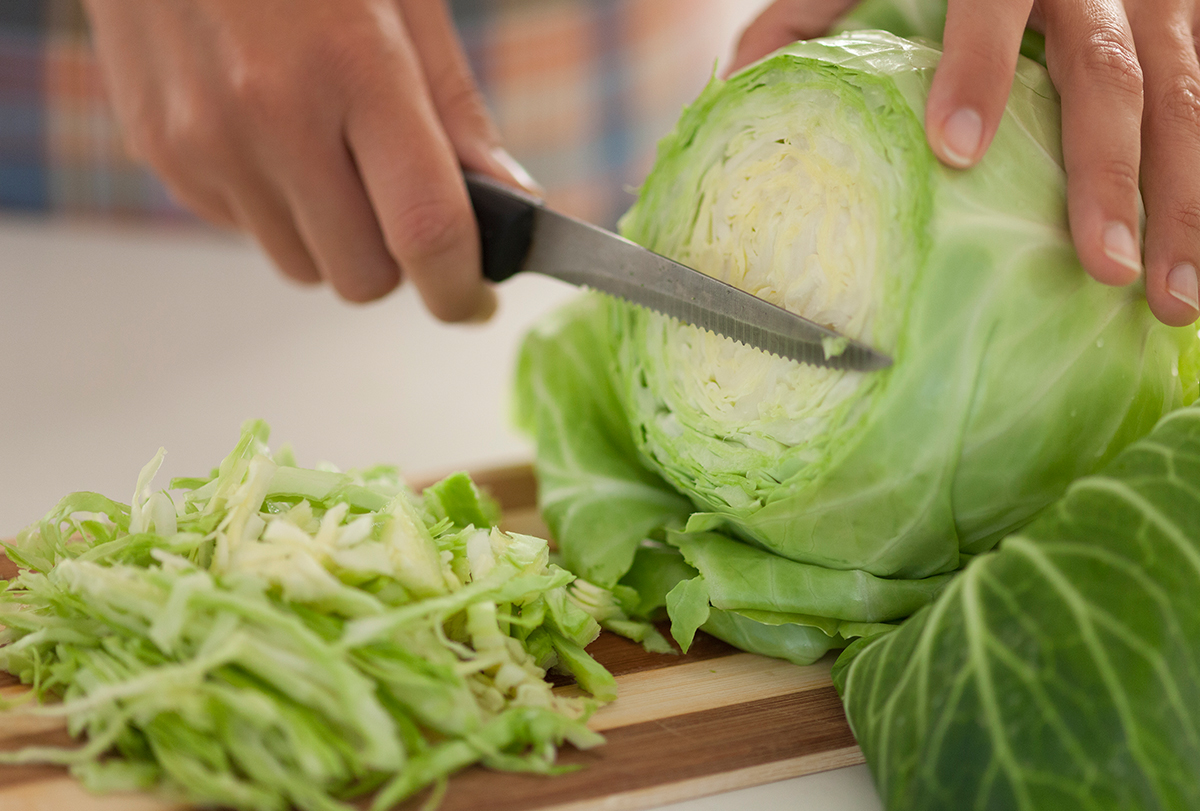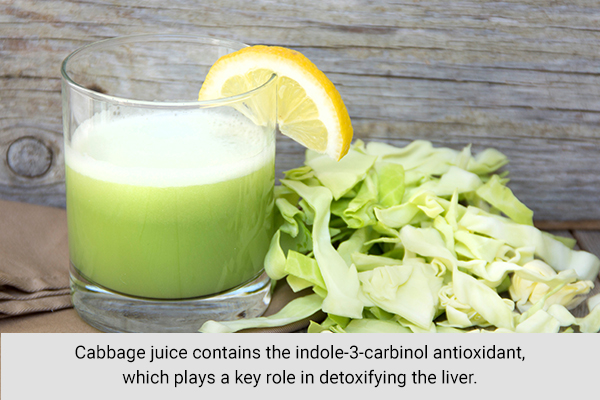In this article:
Despite being widely available throughout the year, cabbage is one leafy, cruciferous vegetable that is often underestimated and undervalued. If not that, it carries the reputation of being one of the lesser cousins of the much more celebrated lettuce.

While the nutritive merits of this oval-shaped ball of leafy goodness seem to be largely lost on the present generation, there was a time when cabbage was treasured by ancient healers who thought it to possess moon power because it grew in the moonlight.
Modern science has also caught on with this age-old wisdom and proved that the healing potential of something as commonplace as cabbage is more than just stuff of folklore.
Cabbage is not only healthy, but it’s also delicious. Often synonymous with the revered American side dish of coleslaw, this fiber-rich vegetable can be used to add a scrumptious bite to a wide variety of dishes such as salads, soups, and stews in both raw and cooked forms.
The ideal way of preparing cabbage, however, is to cook it “al dente,” that is, just enough so that it retains its tender-crispness. This is because overcooking cabbage can remove some of the veggie’s essential nutrients.
You can also ferment cabbage to make sauerkraut or kimchi, which contain enzymes that make it easier for the body to soak in the minerals and vitamins.
Reasons Why Cabbage Is Beneficial for Your Health
Here are 10 health benefits of cabbage, some of which you may find quite surprising.
1. Waist friendly
Cabbage is a good vegetable for people who want to lose weight in a healthy way.
One cup of shredded cabbage contains just 22 calories. (1) Thus, you can easily supplement your diet with a good serving of cabbage that will keep you feeling full without the added fear of putting on weight. No wonder, then, that this nutritionally robust source of roughage is a weight watcher’s delight.
Also, since cabbage is well endowed with insoluble fiber that can’t be broken down in the intestines, it adds bulk to your stools, helping your stomach empty its contents more effectively.
Cabbage is also high in water content, which, coupled with its fibrous content, helps you stay satiated for longer and prevents hunger pangs. Plus, it keeps the body hydrated. (2)
This health claim, however, is no recent revelation and goes as far back as the 1950s when the cabbage soup diet emerged as a hassle-free way for rapid weight loss.
While the diet has its fair share of benefits, it cannot provide optimum sustenance and should not be followed for more than a few days at a time because cabbage soup is low in complex carbohydrates, protein, vitamins, and minerals.
What it really does is help you shed the water weight, so it can be a great technique for short-term weight shedding before an event.
2. May improve your immunity

Cabbage is loaded with vitamin C, a water-soluble vitamin that is essential in the maintenance of the proper functioning of the body, including the optimal working of the immune system. (2) Additionally, vitamin C helps the body absorb non-heme iron, the type of iron found in plant foods.
What’s more, vitamin C is a powerful antioxidant. In fact, it has been extensively researched for its potential cancer-fighting qualities. (3)
So, making cabbage a part of your daily diet can greatly give your health a boost. Try lightly steaming it or eating it raw since extensive cooking can destroy most of the vitamin C.
3. Improves digestion
One way to avoid unwarranted tummy troubles and digestive distress is to up your dietary intake of cabbage.
Cabbage is full of gut-friendly insoluble fiber that helps keep the digestive system healthy by adding bulk to your stools and promoting regular bowel movements.
Its fibrous goodness coupled with its high water content also helps prevent constipation and keeps your digestive tract in the best of health. (4)
On top of that, cabbage’s inherent soluble fiber spurs the growth of gut-friendly bacteria such as Bifidobacterium and Lactobacillus. Such friendly gut flora help protect the immune system and produce critical nutrients, such as vitamins K2 and B12.
4. Regulates blood sugar

The antioxidant and antihyperglycemic properties of cabbage offer therapeutic benefits for diabetes. It helps lower blood sugar levels and aids in insulin production. Moreover, the fiber content in cabbage helps prevent diabetes as it slows the absorption of sugar.
A 2008 study published in Evidence-Based Complementary and Alternative Medicine found that diabetic rats that were fed red cabbage extracts for 60 days exhibited reduced blood glucose levels. Plus, the rats had better renal function and weight loss compared with the control group. (5)
5. Boosts heart health
Including cabbage in your diet can help protect and preserve your cardiovascular functioning.
The anthocyanins found in red cabbage are the flavonoids that impart the vegetable its vibrant color. These pigment-inducing compounds have been found to reduce the risk of heart disease. (6)
Cabbage may also help suppress inflammation in the body that may lead to cardiovascular disease. The high polyphenol content in cabbage also helps prevent platelet buildup and reduces blood pressure. This, in turn, helps lower your risk of cardiovascular disease. (3)(7)
The potassium content in cabbage also helps regulate blood pressure by working against the harmful effects of excess sodium in your body. High potassium intake is also associated with a reduced risk of strokes.
Moreover, cabbage helps reduce your low-density lipoprotein (LDL or “bad” cholesterol) level and increase your level of high-density lipoprotein (HDL or “good” cholesterol). This helps reduce the risk of heart disease over time.
6. Aids in detoxification

Cabbage is beneficial for the body’s natural detoxification process, particularly due to its ample amounts of fiber and sulfur. Toxin buildup in the body is at the root of a number of ailments such as arthritis, skin diseases, rheumatism, and gout.
Fiber binds to harmful toxins such as free radicals and uric acid, preventing their absorption in the body and facilitating their elimination from the body. The glucosinolates, sulfur-containing compounds, in cabbage aid in breaking down harmful chemicals in the body so that they can be eliminated as waste products. (7)
Moreover, cabbage juice contains the indole-3-carbinol antioxidant, which plays a key role in detoxifying the liver.
Thus, help your body cleanse itself from within by increasing your intake of cabbage in the form of a juice, smoothie, or salad.
7. Treats stomach ulcers
Cabbage is effective at treating a stomach ulcer. A study showed very rapid healing of patients with ulcers when treated with cabbage juice for approximately 10 days. (8)
It stimulates the production of an amino acid in the body that promotes blood flow to the stomach lining. This helps strengthen the stomach lining and heal the ulcer.
It is also rich in vitamin C, an antioxidant that helps prevent and treat an H. pylori infection, one of the common causes of stomach ulcers.
How to use:
- Cut half of a raw head of cabbage and two carrots into small pieces.
- Put them in a blender to extract the juice.
- Drink ½ cup of this juice before each meal and at bedtime.
- Repeat daily for a few weeks.
8. Keeps inflammation in check

While inflammation plays an important role in your body, too much of it can be a bad thing. Chronic inflammation has been associated with many diseases ranging from diabetes to arthritis. (9)
Cabbage is rich in anti-inflammatory compounds, especially glutamine, which helps reduce pain and inflammation. Sulforaphane, kaempferol, and other antioxidants found in cabbage also add to its anti-inflammatory effect.
It also has vitamins E and C, which help protect the body from pro-inflammatory molecules called cytokines.
A 2014 study published in the Journal of the Academy of Nutrition and Dietetics found that people who ate the most cruciferous vegetables had less inflammation than those who ate the least. (10)
9. Cures engorgement of the breasts
Dealing with engorgement of the breasts during breastfeeding is nothing less than a nightmare for a mother.
Breast engorgement occurs when your breasts become painfully overstocked with milk. You can use cabbage leaves to reduce the swelling and pain arising from moderate to severe engorgement of the breasts. (11)
The antibiotic and anti-irritant properties of cabbage help reduce tissue congestion by dilating local capillaries and improving the blood flow in the area.
How to use:
- Put a few cabbage leaves in the refrigerator for 30 minutes.
- Place a cold cabbage leaf on the engorged breast.
- When the leaf reaches room temperature, replace it with a new one.
- Do this a few times daily until the engorgement subsides.
10. Heals sprained ankles

If you’ve sprained your ankle, cabbage is effective in getting you the much-needed relief. Its anti-inflammatory effect helps reduce the swelling triggered by sprains and broken bones. (12)
Additionally, this inexpensive source of dietary roughage is generously supplied with calcium, magnesium, and potassium that prevent bone degradation as well as vitamins and phytonutrients that support the healing process.
How to use:
- Remove the outer leaves from the head of cabbage.
- Using a rolling pin, gently crush the leaves so that juice is released.
- Wrap the cabbage leaves in foil and warm them in the oven.
- Put the warm cabbage leaves over the painful area.
- Secure them with a gauze bandage, and then cover the area with plastic wrap to retain its warmth.
- Leave it on for 30 minutes.
Use this remedy twice daily for a few days.
Nutritional Content of Cabbage
Nutritional value of raw cabbage per 100 grams:
| Nutrient | Quantity | Amount |
|---|---|---|
| Water | g | 92.18 |
| Energy | kcal | 25 |
| Protein | g | 1.28 |
| Total lipid | g | 0.10 |
| Carbohydrate | g | 5.8 |
| Fiber | g | 2.5 |
| Sugars | g | 3.2 |
| Calcium, Ca | mg | 40 |
| Iron, Fe | mg | 0.47 |
| Magnesium, Mg | mg | 12 |
| Phosphorus, P | mg | 26 |
| Potassium, K | mg | 170 |
| Sodium, Na | mg | 18 |
| Zinc, Zn | mg | 0.18 |
| Vitamin C | mg | 36.6 |
| Niacin | mg | 0.234 |
| Vitamin B-6 | mg | 0.124 |
| Folate | mcg | 43 |
| Vitamin A | mcg | 5 |
| Vitamin E | mg | 0.15 |
| Vitamin K | mcg | 76.0 |
Precautions and Risk Factors With Cabbage

- If you have thyroid problems, avoid eating very large amounts of cabbage. It may, in very large quantities, interfere with the body’s absorption of iodine.
- Some people may have trouble digesting cruciferous vegetables and may experience digestive symptoms. In such cases, eating small portions and cooking the cabbage well may help.
- When buying cabbage, choose one that is heavy for its size. Make sure the leaves are tight and firm. You can store cabbage in the refrigerator for up to 2 weeks.
- Do not overcook cabbage, as it can lead to a sulfurous odor.
Final Word
Cabbage packs within its layers a number of vital nutrients, including fiber, folate, manganese, calcium, potassium, magnesium, and vitamins B6, K, and C, as well as micronutrients, including vitamin A, iron, and riboflavin. (2)
Further adding to its health-promoting virtues is the fact that cabbage is very low in calories and contains powerful antioxidants, including polyphenols and sulfur compounds. (7)
- Was this article helpful?
- YES, THANKS!NOT REALLY


